Module 2 Unit 1
外研版九年级上册Module 2 Public holidays Unit 1单元整体教学设计

外研版九年级上册Modu1e2Pub1icHo1idays大单元教学设计国的某一节日做简单的介绍,感受我国文化的底蕴,培养学生热爱国家、名族的情怀。
核心语言知识分析:本模块主要语法状语从句的用法,主要学习时间状语从句的用法,使学生能够准确表达,达到自如运用的程度。
知识储备:1 .学生对“节假日”话题并不陌生,在七年级的时候就学过关于“春节”的相关内容,也能够做简单的介绍。
本模块主要谈论世界主要国家的节假日与庆祝活动。
内容比较丰富、有趣,所以学生对话题会比较感兴趣,也很容易进行讨论。
2 .学生在八年级学习了since›when 与whi1e 的基本用法,对这些词的用法有所感知和理解。
3 .学生掌握了一些有效的阅读策略。
可能面临的问题:1 .学生对话题比较熟悉,但是单词的储备还是欠缺,很多的词汇不熟悉,比较难开展讨论,可能只会在文中找些单词来进行描述,信息获取,文化知识的内化对于学生而言有一定难度。
2 .学生可能会分不清when 与whi1e 的用法,弄不清延续性动词和非延续性动词,造成理解上的一定困难。
3 .学生信息收集整理以及有逻辑的写作输出能力有待提高。
模块内容分析(Ana1ysisof the1earning materia1s)学情分析(Ana1ysisof thestudents)I 单元主题:节假日]庆节的庆祝方式,以及从哪一年开始庆祝。
学生能够在听、读任务完成后进行简单的表述。
在学习对话之前,活动1、2的设计为学生扫清了新词障碍。
Why:本单元语篇旨在让学生初步了解中、美两国的节日。
II.教学目标(TeaChingobjectives)在本课学习结束时,学生能够:1.熟练运用文中的重点句型和日常交际用语。
2.通过听、说活动,获取和梳理四大世界奇观的基本信息。
能够简单阐述自己的观点。
II1教学重、难点(Key&dif∏cu1tpoints)1.掌握文中重点词汇和句型。
2.掌握关于停顿的听力技巧,提高听的能力。
外研版英语八年级下册Module 2 Unit1课件
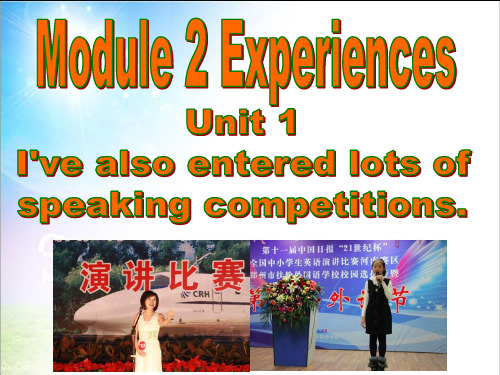
Tony: Hi, Lingling. What are you doing? Lingling: I’m entering a competition.
Tony: What kind of competition? Lingling: A speaking competition.
Tony: “Great.” It’ll help you improve your speaking. And maybe you will win a prize.
Pyramid Egypt
Tower Bridge London
I haven’t visited the Pyramid in Egypt.
Eiffel Tower France
Have you visited …? Yes, I have. / No, I haven’t.
The Tian’anmen Square Beijing
4. invite的用法
They invited me to join their club. 他们邀请我加入他们的俱乐部。
I want to invite mቤተ መጻሕፍቲ ባይዱ friends to a party. 我想邀请我的朋友去参加一个聚会。 Thanks for your invitation. 谢谢你的邀请。
Have you ever entered competitions?
the sports competition the speech competition the kite-flying competition the painting competition
I have visited the Tower Bridge in London.
外研社八年级英语上课件Module_2_Unit_1
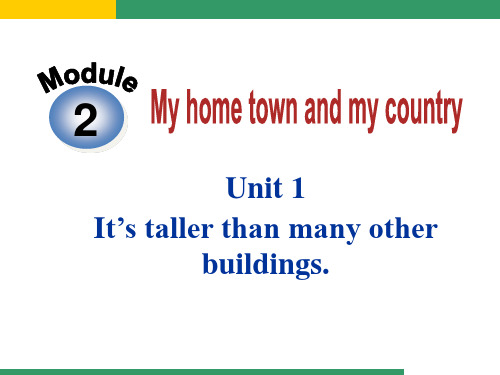
Daming: Well, it’s on the coast near Hong Kong. It was a
small village about thirty years ago, but today it’s a very
big city.
1980s
表示 20世纪80 年代
Tony: So it’s a newer city than Hong Kong?
Daming: Yes, it’s a very new city. In fact, it only became
2
Unit 1 It’s taller than many other
buildings.
Liu Xiang is tall. Pan Changjiang is short.
Liu Xiang is taller than Pan Changjiang.
A: Is that Zhou Xingchi? B: No, it isn’t. It’s Yao Ming. He is taller than Zhou Xingchi.
high hill population river wide
Now listen and complete.
Place: _S_h_a__n_g_h_a_i Population: __2_3_._5_ million Jin Mao Tower: _4_2_0_._5 meters high
Place: _H_o__n_g__K_o_n_g__ Population: ___7___ million Victoria Peak: __5_5_2_ meters high
answer
hill
英语九年级下外研版Module2Unit1教案

初三的学生学习了关于学校方面的词汇,本单元几乎没有新的词汇,对话也相对较为简单,学习本单元应该很轻松。
学法指导
Communicative approach
教 学 过 程
教学内容
教师活动
学生活动
效果预测
及补救措施
修改意见
一、
Wraming-up/lead-in
1.Revise thewords aboutschool.
2.Work inpairs and talkabout yourschool.(Activity 1)
3.Listen andcomplete thesentences.
(Activity 2)
二、Listening
1.listen andread.Nowcomplete
Susie’scolumn
3.To be able to predict which words the speakers is likely to stress.
教学重点
to understand the conversation about schools
教学难点
To talk about the differences between different schools
课 题
M2,U1 They don’t sit inrows.
课时
1
课型
Listening andspeaking
修改意见
教学目标
1.To be able to understand the conversation about schools
2.To be able to compare different schools
外研版八年级下册Module 2 Unit 1

12.英语中的打电话用语 英语中的打电话用语
1. 首次提到 “我” 用 this ,“你”用 that. Eg. 我是陈欢,你是谁? 我是陈欢,你是谁? This is Chen Huan ( speaking ). Who is that ( speaking) ? 2. 打电话时不挂断,等等 打电话时不挂断, hold the line , hold on wait a moment Don’t hang up . 3. 给某人带个口信。 给某人带个口信。 Can I take a message for sb?
根据汉语提示,完成句子。 根据汉语提示,完成句子。 By the way 顺便问一下 1. ____ _____ ____ (顺便问一下 ,why don’t you bring all 顺便问一下) your friends ? where you are from 你是哪儿人)? 2. Could you tell me ____ ______ ____ _____( 你是哪儿人 ? very different from 3. I know that foreigners ____ China ____ _________ ____ find their own countries .( 发现很不一样 发现很不一样) What feel like 4. _____ does it _____ ___________ ( 你感觉如何 ? 你感觉如何)?
私事 something ~al
4. 事实上 in fact 常放于句首 用于进一步说明 句首, 进一步说明。 常放于句首,用于进一步说明。 He often stays at home on Sundays . In fact , he prefers quietness . 5. 公共的 public adj. 公共场所 ~ places 当众 in ~ Don’t talk loudly in ~ .
外研版英语七年级上册 Module 2 Unit 1课件
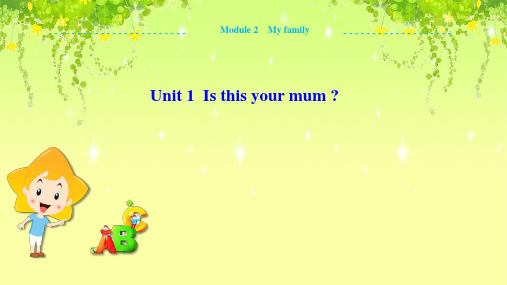
10. My aunt’s daughter is my _c_o_u_si_n__. 11. My uncle’s son is my __c__o_u_s_i_n_.
Lingling
1. Where is Li Lei ?
Li Lei is on the right. 2.Where is Han Mei? Li Lei is next to Han Mei. HanMei is on the left. 3. Where is Lingling ? Han Mei is next to Li Lei. Lingling is in front of Li Ming.
Lingling: Is this your family? Tony: Yes, it is. Lingling: What a big family! Is this your sister? Tony: Yes, it is. Her name is Linda. Lingling: Are these your grandparents? Tony: Yes, they are. My mum's parents are on the left, and my dad's parents are on the right. Lingling: I see. Who’s this?
father mother aunt√ uncle√ uncle √
√sister
cousin cousin Tony
外研版八上英语Module 2Unit 1教案
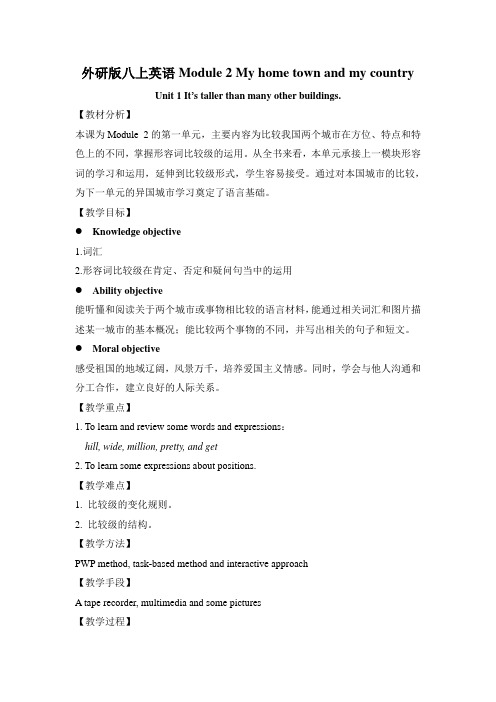
外研版八上英语Module 2 My home town and my country Unit 1 It’s taller than many other buildings.【教材分析】本课为Module 2的第一单元,主要内容为比较我国两个城市在方位、特点和特色上的不同,掌握形容词比较级的运用。
从全书来看,本单元承接上一模块形容词的学习和运用,延伸到比较级形式,学生容易接受。
通过对本国城市的比较,为下一单元的异国城市学习奠定了语言基础。
【教学目标】●Knowledge objective1.词汇2.形容词比较级在肯定、否定和疑问句当中的运用●Ability objective能听懂和阅读关于两个城市或事物相比较的语言材料,能通过相关词汇和图片描述某一城市的基本概况;能比较两个事物的不同,并写出相关的句子和短文。
●Moral objective感受祖国的地域辽阔,风景万千,培养爱国主义情感。
同时,学会与他人沟通和分工合作,建立良好的人际关系。
【教学重点】1. To learn and review some words and expressions:hill, wide, million, pretty, and get2. To learn some expressions about positions.【教学难点】1. 比较级的变化规则。
2. 比较级的结构。
【教学方法】PWP method, task-based method and interactive approach【教学手段】A tape recorder, multimedia and some pictures【教学过程】Teaching Procedures:Step 1 Warming upShow the students videos about Shanghai and Hongkong.Step 2 Listening and vocabulary1. Show the pictures and learn the new words.2. Work on Activity 1.1) Look at the pictures and practice using the words from the box..2) Listen and fill in the blanks.3) Listen again and complete the passage using adjectives.Welcome to Shanghai. This _____ city in East China has a population of 23.5 million. It’s on a _____ river called the Huangpu river. The _____ building you can see is the Jin Man To wer. It’s 420.5 metres _____.This is Hong Kong. It’s a ______ city on the South China coast. Severn million people live here. The hill is Victoria Peak. It’s 552 metres _____.Step 3 Reading1. Show the pictures, learn some new words.2. Listen and mark true or false.1) Shenzhen is a newer city than HongKong.2) Shenzhen became important in the 1970s.3) Shenzhen’s population is over twenty million.4) Diwang tower is taller than many other buildings in Shenzhen.3. Read and complete the passage about Shenzhen.Shenzhen is on the coast near Hong Kong. It became important in the (1) _______. Before that it was a (2)_______. Today the population of Shenzhen is more than (3) _______ million. There are many tall buildings in Shenzhen. A famous one is the (4) ______________. It is (5) _______ than many other buildings in Shenzhen.4. Find the adjectives and their comparatives in the sentences.1) So it’s a newer city than Hong Kong?2) It’s getting bigger and busier.3) That’s larger than the population of ma ny other cities in China.4) Its streets are much wider and cleaner too.5) It’s taller than many other buildings in Shenzhen.3. Complete the passage about Shenzhen.4. Everyday English.5. Point out the main points in the passage.Step 4 Language points1. populationpopulation意为“人口;全体居民”,是一个集合名词,在句中作主语时,谓语动词通常用单数形式。
外研版英语九上试题module2--unit1课文翻译

Module 2 Public holidays 公共假日Unit 1 My family always go somewhere interesting as soon as the holiday begins.我的家人总是假期一开始就去有趣的地方旅游。
课文全译教材内容(见原书P2-P3)译文在线(见原书P4-P6)Listening and vocabulary1 Look at the picture and answer the questions.1 Which public holiday are people celebrating?2 When is this holiday in China?2 Complete the sentences with the dates of Labour Day in China, the UK /ju: 'kei/ and the US.1 Labour Day in China is on __________.2 Labour Day in the UK is on __________.3 Labour Day in the US is on __________.Now listen and check.3 Listen and read.Tony: The First of October is China’s National Day, isn’t it, Lingling?Lingling: Yes. The People’s Republic of China was founded /'faundid/ on 1st October 1949. People have celebrated the National Day since then. There are flowers and national flags /flæɡz/ everywhere, and we have a three-day holiday.Tony: Do you have any plans for the holiday this year? Lingling: Yes. My parents and I are going to visit some friends in Shandong Province. While we’re staying with them, we’re going to spend one day in Qingdao. We’ll stay in Shandong Province until the end of the holiday. When is your national day, Betty?Betty: Our national day is Independence Day. It’s on 4th July. We’ve celebrated it since 1777. It’s a public holiday, but we only have one day off. On that day, there are all kinds of holiday activities. Since it’s the start of the vacation /və'keiʃən/ season /'si:zən/, most people take a vacation some time in July or August.Lingling: And anything special?Betty: Well, you can see American flags everywhere. We usually have a picnic somewhere nice. Kids have great fun. 听力与词汇1 看图回答问题。
外研版英语八年级上册Module 2 Unit 1课件
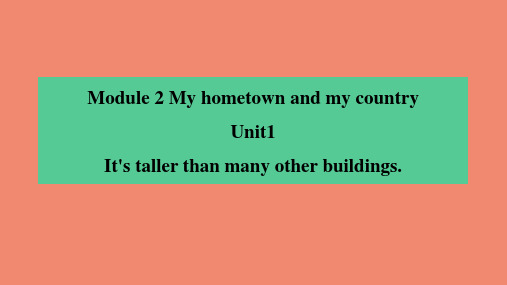
older newer
7.cool cooler 8.small smaller
9.cold colder 10.heavy heavier
11.fat fatter 12.thin thinner
Language points
Tony: Hey, DaminPgr!ettHy gooowd 很w好as your weekend? Daming: Pretty good! I went to Shenzhen. Tony: Where’s Shenzhen? Daming: Well, it’s on the coast near Hong Kong. It was a small village about thirtinythyee19a8r0ss表a示g“o,在b2u0世t纪to80d年a代y”it。’s结a very big city.Tony: So it’s a new构 Tehr为es“ce isiitnnygthertesh+wa年enre+pHso”p。oulnarginKthoe 1n9g60?s. Daming: Yes, it’s a very这n些e歌w手c在it2y0世. I纪n60f年a代ct很,受it欢o迎n。ly became important in the 1980s. It’s getting bigger and busier. Someday it will become as busy as Hong Kong. I’m sure.
Find the sentences with the comparative degree(比较级) 1.It’s a newer city than Hong Kong. 2.It’s getting bigger and busier. 3.That’s larger than the population of many other cities in China. 4.Its streets are much wider and cleaner too. 5.It’s taller than many other buildings in Shenzhen.
外研版英语七年级上册Module 2 Unit1 课文重难点(复习课件,附练习)

What a fine day it is!
family, home和house 1) family意为“家,家庭,家人”,着重
指由家庭成员组成的社会基本结构— —家庭或家庭中的每个成员,如: I love my family. 我爱我家。
next to是介词短语,意思是“紧挨着, 紧靠着”,这里的next to her用来修饰 the woman。
Tom lives next to Daniel. 汤姆住在丹尼尔隔壁。
4. What a big family! 真是一个大家庭 啊!
这是一个省略了的感叹句,完整的形式 是 What a big family it is! 基本句型结构:What + a(an) + (形容词
Words and expressions
woman n. 成年女子,妇女 next adj. 紧挨着,紧靠着 adv. 紧接下来地,下一步
next to 在……旁边,紧挨着 husband n. 丈夫
front n. 前面,正面 in front of 在……的前面
those pron. 那些
1. Is this your family? 这是你的家人吗?
—Yes, he is. 4. Mrs Chen’s _h_u_s_b_a_n_d_ (丈夫) is very
tall.
5. The boy is my English teacher’s ___s_o_n___ (儿子).
— Yes, it is. / No, it isn’t. 5. — Are these …?
—Yes, they are. / No, they aren’t.
外研版小学英语三年级第二册Module2Unit1教材内容全解

外研版小学英语三年级第二册Module2Unit1教材内容全解Unit1教材内容全解Unit1 They’re monkeys.它们是猴子。
1.Listen and chant.听一听并说唱。
【课文全译】Here is a monkey, 这是(这儿有)一只猴子,a father monkey. 一个猴爸爸。
Here is a monkey, 这是(这儿有)一只猴子,a mother monkey. 一个猴妈妈。
Here is a monkey, 这是(这儿有)一只猴子a baby monkey. 一个猴宝宝。
They are all in the zoo. 它们都在动物园里。
【课文注解】①here is……意思是“这是……;这儿有……”,其后常跟单数名词;here are也是“这是……;这儿有……”的意思,后跟复数名词。
例如:Here’s my father.这是我父亲。
Here’s a present for you。
这儿有一件礼物给你。
Here’re some pencils.这是(这儿有)些铅笔。
②monkey(名词)“猴子”,复数monkeys,a monkey一只老虎,two monkeys两只老虎,形近词donkey驴,Monkey King美猴王。
例如:There are many monkeys in the zoo.动物园里有很多猴子。
A monkey likes bananas.猴子喜欢(吃)香蕉。
③father(名词)“父亲,爸爸”,同义词dad(口语),对应词mother,a father monkey 意为“(一个)猴爸爸”。
This is my father.=This is my dad.这是我爸爸。
④mother(名词)“母亲,妈妈”,同义词mum/mom(口语),对应词father,a mother monkey意为“(一个)猴妈妈”。
My mother is beautiful.=My mum is beautiful.我妈妈很漂亮。
外研版英语五年级上册 01 Module 2Unit 1
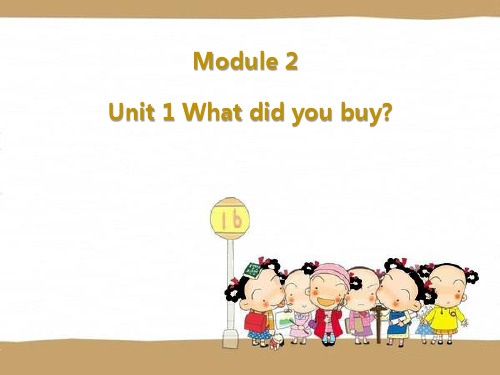
知识点
need / niːd / v . 需要[四会]
形近词记忆法:归纳词形相近的单词,把它们放在一起记 忆的方法就是形近词记忆法。如,need 需 要—feed 喂养
need 的用法: (1) need sth. 需要某物
知识点
What did you buy? 你买什么了? 句型结构:What did+ 某人+buy?
用来询问某人买了什么。 答语: 某人+ 动词(短语)的过去式+ 其他.
例句: —What did your mother buy for you? 你妈妈为你买了什么?
—She bought a book for me. 她给我买了一本书。
7. —How much _____A____ the cheese?
—20 yuan.
A. is
B. are
C. do
8. They didn’t buy ____A____
B. some
C. an
9. —Do you have red pencils?
—Yes, I have ____A____.
例句:We need some books. 我们需要一些书。
知识点
need 的用法: (2) need to do sth. 需要做某事
例句:He didn’t need to come last night. 昨天晚上他不需要来。
词性变化: need (n.) 需要,必要
知识点
first /fɜːst/ adv. & num. 首先,第一[四会] 例句:He was the first man to come.
外研社小学英语五年级英语下册module2第1课时Unit1ShelearntEnglish.

Module 2模块课时划分:共分2课时第1课时Unit 1 She learnt English.教学分析Module 2是本册课本的第二模块,主要描述某人过去到现在的变化。
Unit 1作为第一课时,开篇活动1的四个情景展现Ms Smart的积极生活,她学习跳舞learnt to dance、学习做饭learnt to cook、她教语言taught languages、她写书wrote a book,呈现了新词汇learn to do, taught和wrote。
活动2呈现的是主情景,Lingling在向Sam和Amy展示自己爷爷奶奶的照片。
Sam问到奶奶照片时,玲玲说奶奶从前是舞蹈演员,在中国很多城市演出,学过英语。
Amy问到爷爷照片时,玲玲说爷爷从前是司机,他虽然以前没学过英语,但现在在学。
这一情景通过人的变化引出不同时态、句型及新词汇:She learnt English. He’s learningEnglish now. dancer, foreign languages等。
活动3和4巩固操练一般疑问句及其答语等,让学生学会运用语言。
本节课的学习重点是一般过去时、现在进行时等时态和一般疑问句及其答语等,前面已经讲了一些相关词句。
老师可通过看视频、唱歌、游戏、情景教学、调查等,让学生利用所学的句型谈论和评价人们的变化。
本模块生词较多,可以让学生先认知、学习,逐步掌握,注意为学生搭梯子、铺路子,教学由易到难,坚持低起点、小步子、快节奏、高要求。
教学目标语言知识目标:1. 词汇:learnt, taught, studied, hard, foreign languages, wrote, dancer等。
2. 能够正确运用句型:She learnt to cook.She learnt English.Did she learn any foreign languages?Yes, she did. / No, she didn’t.He is learning English now.语言技能目标:1. 能用所学时态描述某人过去到现在的变化。
九年级英语上册Module 2 Unit 1课件
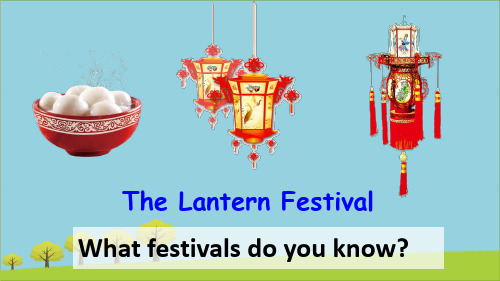
China National day 1st October three days
US Independence day
4th July one day
Tony: The First of October is China’s National
Day, isn’t it, Lingling?
Lingling: Yes. The People’s Republic of China was
3. There are flowers and national flags everywhere, and we have a three-day holiday.
基数词+名词 (+形容词)”可构成复合形容词, 在句中作定语。其中,词与词之间用连字符连接, 名词用单数形式。
如:a four-year-old boy。
Daming: Do you have a national day in the UK, Tony?
Tony: No, we don’t –we celebrate Christmas with a two-day holiday. And my family always go somewhere interesting as soon as the holiday begins. 一……就……
on 4th July. It’s the start of the v_a_c_a_t_io_n_ season.
activity flag found vacation
2 On 1st October, you can see the national _f_la_g_s_ everywhere in China.
Module 2 Unit1 外研版九年级上册英语
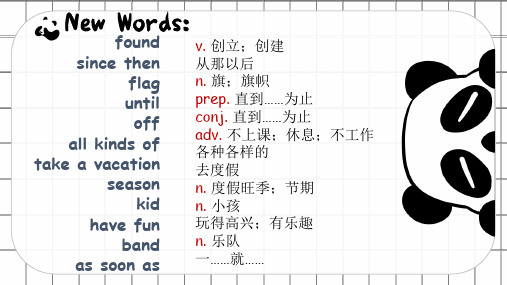
on the first Monday in September .
Tony and his friends are talking about something. Let’s listen and find out what they are talking.
3. Listen and choose.
have seven days off =have a seven-day holiday
We have a seven-day holiday during
.
What public holidays do you know about China? How many days off do we have?
??
IItt’’ss MAparyilththeefiffotuhr.th.
It’s the fourth of April. It’s the fifth of May.
WWhehnenisisththee
?? ?
IItt’’ss DOecctoembebretrhtehfeir2s5t.th. IItt’’ssIItttt’’hhsseetJh2fuie5rltsyfhtotuoohrffetODhfoceoutcfoerbJmthuebr.ly.e.r.
kid n. 小孩
have fun 玩得高兴;有乐趣
band as soon as
n. 乐队 一……就……
Module 2 Public Holidays
Yoyo
What public holidays do you know about China? How many days off do we have?
去e ve要用f替,ty要变tie 遇到几十几,变个位数就可以
- 1、下载文档前请自行甄别文档内容的完整性,平台不提供额外的编辑、内容补充、找答案等附加服务。
- 2、"仅部分预览"的文档,不可在线预览部分如存在完整性等问题,可反馈申请退款(可完整预览的文档不适用该条件!)。
- 3、如文档侵犯您的权益,请联系客服反馈,我们会尽快为您处理(人工客服工作时间:9:00-18:30)。
Could you tell me when the train will leave?
2. 陈述句变为宾语从句时, 要注意人称和 时态的变化, 语序不变。 She said, “I will leave a message on the desk.”
B: Who’s calling, please! C: This is Sally Maxwell speaking. ______ B: ______________? Can I help you C: Yes, please! Can you ask Chen Huan interview if I can bring a friend to the _________ next week? C: I’m ____ that’ll be OK! sure B: Great! Thank you! C: Bye!
Module 2 Friendship
Unit 1 Can you tell me where you’re from?
New words
friendship hold hold the line right now if whether whether … or not personal 友谊, 友好 拿, 举, 持;拥有 (不挂断电话) 等一下 现在 是否; 如果 是否 是否 个人的,私人的
Grammar
The Object Clause 宾语从句
在句中充当宾语成分, 即跟在及物动词 后面、不及物动词加介词后面, 或介词后面 的从句叫做宾语从句。 宾语从句是主从复合句中最常见的从句 之一。 它作及物动词、介词或者某些形容词 的宾语。
The Object Clause 宾语从句
1. 当从句为陈述句时用, 连词 that 引导 引 2. 当从句为一般疑问句时用, if / whether (但whether可以与or not连用, if不能) 导 3. 当从句为特殊疑问句时, 用when, where, how, 词 why, who, what 等疑问词引导 1. 主句现在时, 从句可用任何时态。 2. 主句过去时,从句要改用相对应的过去某种时态。 时 但客观事实、真理仍用一般现在时; Could you 态 tell me. . . ?只是委婉的“请求” , 并不表示过去时, 所以其后的宾语从句可根据需要用任何时态。
1 Listen and find out how many people you hear. Answer:
Three people.
2 Listen and number the sentences in the order you hear them.
a: Is Chen Huan there? b: Is that Chen Huan speaking? c: I’ll call back later. d: This is Sally Maxwell speaking. e: Who’s calling, please? f: Hold the line, please. g: Sorry. He isn’t here right now. h: Can I take a message?
1
3 6 8 7 2 4 5
Listen and fill in blank.
A: Good morning! Radio Beijing! B: Hello, is Chen Huan there? A: Hold the line please! ___________, C: Hello? B: Hello. Is that Chen Huan speaking? C: This is Chen Huan’s secretary speaking. Sorry! He isn’t here _________. Can I right now _____________? take a message B: No, thank you. I’ll call back later.
一般情况下, if 和whether可以互换, 但 以下3 种情况只能用whether: ① 在不定式前: Whether to go there or not hasn’t been decided. ② 在介词前: It depends on whether it is going to rain. ③ 与or not连用: They are talking about whether to go there or not.
3. 当宾语从句叙述的是客观真理时, 不管 主句谓语的时态如何, 从句都用一般现 在时。 The teacher told us (that) the earth moves around the sun. Grandma told me the sun rises in the east.
外研初中二年级下册
3. Why does Chen Huan call Sally a foreigner? Because she is not Chinese. 4. Why does Chen Huan record his talk with Sally?
Because their talk will be part of a programme on the radio.
→ She said she would leave a message on the
desk. 3. 一般疑问句和特殊疑问句变为宾语从句时, 也要注意人称和时态的变化, 后接陈述语序。 “Where are the tickets?” I asked him.
→ I asked him where the tickets.
语 不管是一般疑问句还是特殊疑问句, 宾语从句都 序 要用 陈述句语序 (即: 主 + 谓 + 宾).
宾语从句三要素:引导词,语序,时态
宾语从句的连接词: 1. 连词that, 只起连接作用, 在从句中不作句 子成分, 也无词汇意义, 在口语中常被省略。 He knew (that) he should work hard. 2. 连词 if / whether, 它们起连接作用, 在从句 中不作句子成分, 作“是否”解, 在口语中 多用if。 Tom don’t know if / whether his grandpa liked the present. He asked me whether or not I was coming.
4 Check (√) the true sentences.
1. Chen Huan has already met Sally. 2. Sally is waiting for Chen Huan to arrive. 3. Sally is unhappy in China. 4. Sally thinks that the word “foreigner” isn’t very friendly. 5. Chen Huan invites Sally and her friends to visit Radio Beijing. × √
3. in fact 实际上 (在句中作状语, 常用来强调) e.g. He likes sports shows, in fact, he prefers game shows.
4. in a couple of months 几个月之后 1) “in + 一段时间” 构成的时间状语用在一 般 将来时态中, 意为“„„之后” e.g. We’ll visit your school in a few days. 2) a couple of 一些, 几个 = several e.g. They will be back in a couple of weeks. I’ll just have a couple of cakes. 5. be different from 与„„不同 反义:be the same as 与„„同样的 e.g. City life is very different from country life.
3. 连接代词 who, whom, whose, what, which, 连接副词 w用, 作句子成分, 各有自己的意义。 The teacher asked the new students which class he was in. I wonder where he got so much money.
宾语从句的时态 宾语从句中谓语动词的时态, 常常受到主句 谓语时态的制约, 此为时态呼应。 1. 如果主句谓语是一般现在时或将来时, 从句 谓语的时态不受限制; 从句根据实际情况使 用任何时态。 2. 如果主句谓语的时态是一般过去时, 从句一 般要随着改为相应的过去时态(一般过去时、 过去进行时、过去将来时、过去完成时)。 I thought (that) he is reading. (×) I thought (that) he was reading. (√)
An exciting place Play her last public concert on Starsearch
5 Answer the questions about the words in the box.
foreigner miss personal public parent record
宾语从句的语序 1.宾语从句的语序是陈述句语序, 即: 连接词 + 主语 + 谓语 + 其它成分。而不是疑问句 的倒装结构。 Can you tell me where will we go?(×) Can you tell me where we will go?(√)
e.g. I don’t know what they are looking for.
